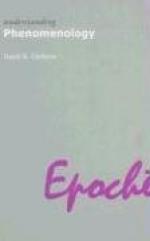|
This section contains 17,485 words (approx. 59 pages at 300 words per page) |

|
"Phenomenology" is a term that has been used in as many widely varying senses in modern philosophy as has the term that names the subject matter of this science, "phenomena."
Johann Heinrich Lambert, a German philosopher contemporary with Immanuel Kant, first spoke of a discipline that he called "phenomenology" in his Neues Organon (Leipzig, 1764). He took "phenomenon" to refer to the illusory features of human experience and hence defined phenomenology as the "theory of illusion." Kant himself used "phenomenology" only twice, but he gave a new and broader sense to "phenomenon" that, in turn, resulted in a redefinition of "phenomenology." Kant distinguished objects and events as they appear in our experience from objects and events as they are in themselves, independently of the forms imposed on them by our cognitive faculties. The former he called "phenomena"; the latter, "noumena," or "things-in-themselves." All we can ever know, Kant thought...
|
This section contains 17,485 words (approx. 59 pages at 300 words per page) |

|


